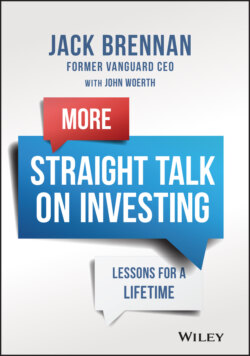Читать книгу More Straight Talk on Investing - John J. Brennan - Страница 38
Saving for Short-Term Needs
ОглавлениеYou need immediate access to the money to meet current expenses, so you would eliminate long-term investment vehicles like stock funds and long-term bond funds from consideration. A rule of thumb in investing is that you should not invest money in stock funds that you will need in less than five years. Most people use a checking account for the money that's needed to meet current expenses. That's typically a checking account that pays little or no interest, so the trade-off for the convenience of this account is that you are earning virtually no return.
Your rainy-day fund is a slightly different issue. Since this is money that you don't plan to touch except in an emergency, leaving it sitting in an interest-free bank account makes no sense whatsoever. A better choice would be to invest it in a money market fund, an ultra-short bond fund, or short-term Certificates of Deposit, which offer some return while still being relatively liquid, or readily available should an emergency arise. Such a choice will enable you to make your money work as hard for you as possible. If interest rates are low, you may wonder what the fuss is over a return of 1% or 2%. But ask yourself a simple question: Would you rather have the 1% or 2% in your pocket, or let the financial institution have it? Small amounts of interest eventually add up to impressive sums. Suppose you put $10,000 in a savings account that pays 2% a year, and it sits there untouched for 25 years. It will turn into more than $16,406.
